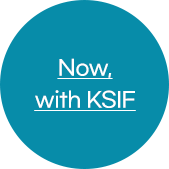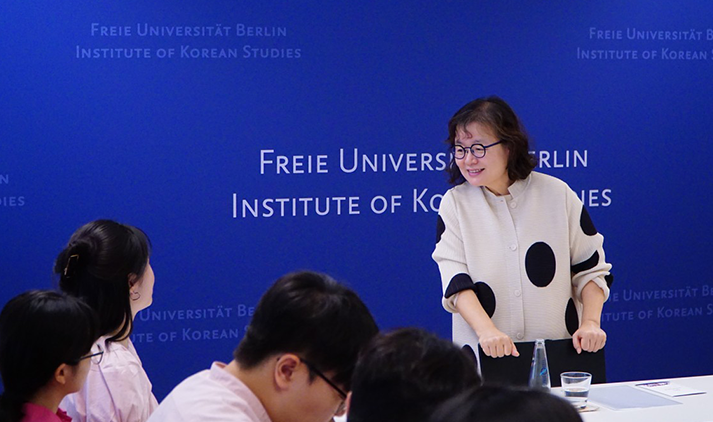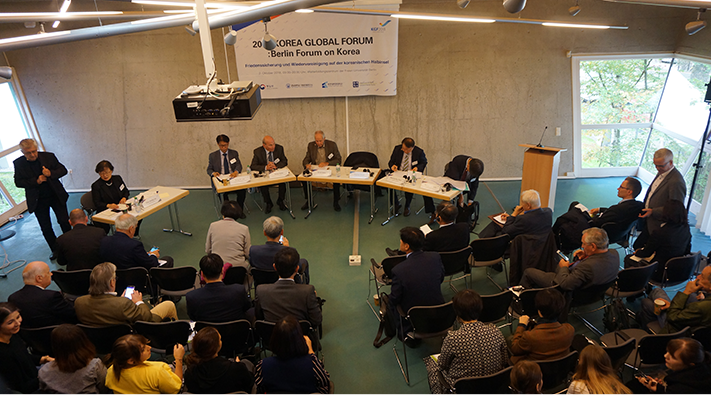

Professor Lee Eun-jeung of the Department
of Korean Studies at Free University of Berlin,
nurturing the next generation of
Korean experts in the heart of Europe
Starting this year, the Department of Korean Studies at Free University of Berlin has begun operating KSI Berlin
as a local operating institution. Professor Lee Eun-jeung, who spearheaded the establishment of both KSI Berlin
and the Graduate School of East Asian Studies at Free University of Berlin, has been educating and conducting
research on Korea in Germany, a country that once knew little about Korean studies. Through her efforts, she has
helped foster many students’ understanding of Korea.
Hello, Professor Lee! Thank you for agreeing to this interview. We know you received your Ph.D. in the history
of political thought from the University of Göttingen and have been leading the study of Korean studies in the
German-speaking world since becoming a full professor at Free University of Berlin in 2008. Could you
introduce yourself to the KSI community worldwide?
Hello. I’m Professor Lee Eun-jeung from the Department of Korean Studies at Free University of Berlin. I first
went to study in West Germany in 1984, when the country was still divided, and completed my studies at the
University of Göttingen. After German reunification, I received my habilitation at the University of Halle. In
2008, I was appointed as the inaugural professor of the newly established Department of Korean Studies at Free
University of Berlin, located in the capital of Germany. Since then, I have been working to educate and conduct
research on Korea, striving to introduce Korean studies to German society, where knowledge of Korea was
previously limited.
Could you please introduce the Department of Korean Studies at Free University of Berlin?
The Department of Korean Studies at Free University of Berlin is officially called the "Institute of Korean
Studies." We currently have around 300 students, including both undergraduate and graduate students, a number
that has remained stable over the past 10 years. Our educational goal is to provide students with opportunities
to learn about both traditional and contemporary Korea, as well as both South and North Korea. Our curriculum is
designed to reflect this comprehensive approach, which sets us apart from other Korean Studies programs in
Europe.
One distinctive feature of the curriculum at Free University of Berlin’s Korean Studies department is the
systematic training in Korean Studies research methodology, which allows students to study Korean Studies as an
academic discipline. Methodology classes begin in the first semester of the undergraduate program and continue
across multiple semesters until graduation. First-year students take introductory courses in Korean culture,
history, and politics, as well as Korean Studies methodology. In their second year, they study Korean
administration, international politics, and North Korea, while also engaging in seminars where they analyze
selected topics. Students who wish to study in Korea can go there as exchange students after their second year.
In their final year, students delve deeper into various research fields through advanced seminars.
Korean language classes are fundamental, serving as a tool for Korean Studies research. Our students are
required to take Korean language courses, from everyday conversational skills to advanced academic Korean,
throughout their studies. As a result, we often hear that our students' proficiency in Korean is exceptional.
However, it’s important to note that language is just a means, not the ultimate goal.
Our graduates, who have earned bachelor’s or master’s degrees in Korean Studies, find employment in various
fields. Many work for companies involved with Korea, while others find positions in the German government or
public institutions. Unfortunately, German universities do not have a systematic way of tracking alumni, so we
hear updates on our graduates’ careers only through personal contact.
(Left to right) Spring and winter views of the Department of Korean Studies (Institute of Korean Studies) at
Free University of Berlin
In 2012, you spearheaded the establishment of the Graduate School of East Asian Studies (GEAS) at Free
University of Berlin. Over the past decade, you’ve overseen numerous research projects and produced a variety
of talented individuals. Could you share any particularly memorable research or achievements from this period?
Until recently, Germans tended to equate East Asia with Japan and China, often thinking of Korea as a periphery
of China or Japan. Few considered Korea, Japan, and China as equally important. When I established the Graduate
School of East Asian Studies at Free University of Berlin in 2012, I emphasized to my German colleagues that we
needed to break free from this conventional mindset and approach the three East Asian countries with equal
importance in education and research. We also maintained equal representation of students specializing in Korea,
Japan, and China in the doctoral program.
Today, graduates from the Graduate School of East Asian Studies and the Institute of Korean Studies are active
around the world. Their doctoral dissertations cover a wide range of topics, such as Korean political culture,
political discourse, party systems, labor markets, North Korean human rights, political thought, and
contemporary society and culture. The reason we can support such a diverse range of research topics in a program
with only one full-time professor is that we have adopted a mentorship team system. Professors from different
disciplines and regional studies serve as mentors, guiding students’ dissertations together. This
interdisciplinary approach naturally fosters cross-disciplinary research skills in our PhD students.
The Institute of Korean Studies also conducts its own research projects and participates in interdisciplinary
research projects in Berlin. One of our recent projects focused on seowon (Confucian academies) in East Asia,
while another explored the Korean Wave (hallyu) from a cultural history perspective. Our research on seowon,
which investigated and analyzed Confucian academies in various East Asian countries, garnered international
attention. As for the Korean Wave project, we are still in the early stages, and it will take more time before
we see substantial research outcomes. Additionally, the Institute of Korean Studies has long been involved in
research exploring the implications of German reunification for the Korean Peninsula.
 Scene from the 2018 Korea Global Forum (KGF), co-hosted by the Ministry of Unification, Kyungnam University's
Institute for Far Eastern Studies, University of North Korean Studies, and Free University of Berlin's Institute
of Korean Studies
Scene from the 2018 Korea Global Forum (KGF), co-hosted by the Ministry of Unification, Kyungnam University's
Institute for Far Eastern Studies, University of North Korean Studies, and Free University of Berlin's Institute
of Korean Studies
Do you think the popularity and growth of Korean Studies in Germany are largely due to the "Korean Wave
(hallyu)"? Have you noticed any changes in German society while teaching at the Department of Korean Studies?
The Korean Wave in Germany actually began around the time of the COVID-19 pandemic in 2020, but the surge in
student numbers in Korean Studies happened between 2010 and 2014. Since then, we’ve implemented a cap, allowing
only 53 students per year to enroll in the major. In the past, only one or two freshmen had prior experience
studying Korean. Now, by the 2020s, only one or two students among the 53 new enrollees have never studied
Korean. This change reflects a shift in how Germany views Korea. Many of our students became interested in Korea
long before the Korean Wave took off in Germany.
As someone who has led the rapid development of Korean Studies at Free University of Berlin, what has been
your biggest challenge, and how did you overcome it?
After becoming a full professor at Free University of Berlin’s Department of Korean Studies, my biggest
challenge was introducing Korea to a German society that knew very little about it. When explaining Korea to
Germans, I often had to unfold a map and point out where Korea is located. In 2016, I was the first non-European
scholar in the 300-year history of the Berlin-Brandenburg Academy of Sciences to be elected as a full member.
During the introduction ceremony, the president of the academy mentioned Korean Studies as if it were a
completely unknown field. So, the 300 students in our department studying Korean Studies are quite exceptional
in the German context.
To address this, I’ve focused on introducing Korea to German youth. For the past 10 years, I’ve organized Korean
Studies workshops for middle and high school teachers to help them bring Korea into their classrooms. Since one
teacher can educate over 100 students, I realized that raising awareness among teachers was an effective way to
spread knowledge about Korea.
Each year, we invite about 25 German teachers to Berlin for a 3-night, 4-day program where we introduce them to
various topics about Korea and discuss how they can integrate these into their lessons. As a result of these
efforts, some schools have even included Korea-related topics in their Abitur (university entrance exam)
questions. I believe that as more young people learn about Korea and become interested in Korean culture, the
number of Korea enthusiasts in Germany will naturally increase.
From this year, Free University of Berlin is operating KSI Berlin as a local operating institution. What
motivated you to run KSI Berlin, and what goals do you hope to achieve through it?
The decision to operate KSI Berlin was motivated by our desire to provide young people in Berlin with the
opportunity to learn Korean. Our goal is to establish a foundation that allows Korean to be officially
recognized as a second foreign language in Berlin. Additionally, given the university setting of our KSI, we aim
to offer cultural programs that help deepen students’ understanding of Korean culture.
(Left to right) Front view of the Korean Studies building at Free University of Berlin and a classroom interior
What are your views on the prospects of Korean Studies and Korean language education in Europe? Additionally,
could you offer some suggestions for KSI as it continues to play a bridging role in promoting Korean language
and culture?
It’s clear that in recent years, German media coverage of Korea has increased, and general interest in Korea
among the public has grown as well. However, it is crucial that this interest does not remain a passing trend
but instead develops into a deep and sustained understanding of Korea.
This is a challenge that Korean Studies and Korean language education must address moving forward. Simply
promoting "Korean things" unilaterally will no longer suffice in deepening the understanding of Korea. In this
regard, it would be great if KSI Berlin could create more opportunities for dialogue and critical reflection on
these topics.
Lastly, do you have any words of encouragement for the next generation of Korean Studies researchers in
Europe, as well as prospective KSI learners around the world who are passionate about Korean language and
culture?
I hope the next generation of Korean Studies researchers will elevate the field to a higher level. It would be
wonderful to see discussions on how to explore the unique aesthetics embedded in Korean culture and the distinct
thought processes of the Korean people, expanding beyond the boundaries of Korean Studies to influence the
broader academic community.
If more people choose to study Korea and the Korean language, such changes might happen even sooner than I
anticipate. In that sense, I’m deeply grateful to all the prospective KSI learners who are eager to study Korean
and Korean culture, as well as to the current learners who have become part of this knowledge community striving
to understand Korea.